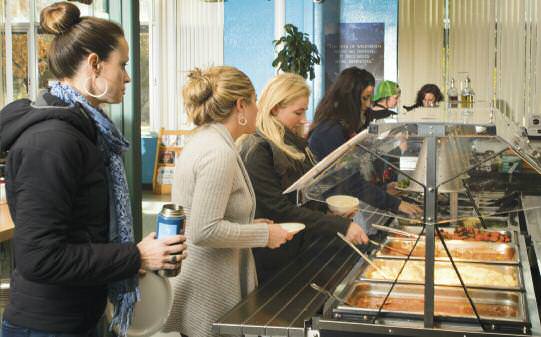feature
HEALTHY WORKPLACES
Several Reno-Tahoe businesses offer employees nutritious choices.
WRITTEN BY LAUREL WINTERBOURNE
PHOTOS BY ASA GILMORE
Asian-braised organic short ribs with wasabi mashed potatoes, braised baby bok choy, and carrots with an orange ginger glaze is one of Patagonia employees’ favorite dishes served at the Reno Service Center’s café.
The eco-friendly outdoor clothing manufacturer is one of a handful of locally based businesses whose leaders have made it a priority to incorporate healthy, natural, sustainable food options into the workplace. From farm stands to build-your-own Community Supported Agriculture boxes, local company managers are creating access to good food choices and healthy incentives for employees. The results are evident in the workers’ health, happiness, and enthusiasm.
The service center’s café, Trukizo Canteen, was inspired by the café at Patagonia’s corporate headquarters in Ventura, Calif. Since the first meal was served in May 2013, breakfast and lunch have been offered daily. The cost is subsidized by Patagonia, making it more affordable for employees. Head chef Laura Rowland sources food based on whether products are farmed using organic or biodynamic methods, sustainably harvested, and local. The idea is to not increase the company’s footprint and not do unnecessary harm while also inspiring others to do the same. Patagonia has an on-site garden created and managed by River School Farm in Reno. The café has been sourcing from the garden since May 2014 and provides 25 percent of the café’s produce.
Rowland sees the café as a true morale booster for employees, showing them that company leaders care and give back them.
“Aside from supporting local purveyors, offering healthy food to those who sustain your business is a no-brainer,” Rowland says. “We try to offer the same flavor protein items daily with regard to vegetarian and vegan preferences. We also cater to gluten-free and lactose-free folks.”
The choices appeal to many Patagonia employees.
“Having an organic café in our building gives me so much more free time during my day,” says Patagonia employee Celia Johnson. “Instead of having to plan out a breakfast and lunch that meet my dietary needs, I can always count on having a healthy, satisfying meal at work.”

Customizable CSA
Managers at the Tahoe Mountain Club in Truckee were looking for ways to help members and employees conveniently, affordably, and regularly access fresh, local produce. Kendra McGargill, events manager at the homeowner and golf association, partnered with Tahoe Food Hub to create a CSA program for its North Tahoe members and staff. The hub’s leaders make the process seamless with an easy order form and weekly deliveries.
After the program’s initial year, Susie Sutphin, the hub’s founder and executive director, approached McGargill with the idea of a custom-built CSA utilizing the hub’s network of farmers.
“For us, customizing our orders allowed us to give members and staff an opportunity to know what would be coming in their farm share and allowed recipients to prepare a grocery list for supplemental ingredients to best utilize their farm share,” McGargill says. “Having a constant supply of fresh and sustainably grown produce at hand every day makes it easy for TMC employees to eat healthier all of the time.”
Decision makers at TMC also were seeking programs to offer their staff members to encourage and support a healthy lifestyle. They came up with the idea to offer an annual allowance of $500 to be used toward recreational activities and healthy-lifestyle expenses, including ski passes, gym memberships, and participation in its CSA program. The program has been a success and well received by TMC staff.
Healthy hospitals
Directors at Tahoe Forest Hospital in Truckee are striving to perpetuate health for its employees. Caroline Ford, executive director of the hospital’s wellness neighborhood, and Sutphin of Tahoe Food Hub collaborated to create a farm stand at the hospital. Fresh fruits and vegetables are sold out of the back of a red 1922 Ford Model T delivery truck to its 700-plus employees and contractors in the summer months. The hospital’s leaders partnered with the hub in an effort to increase its employees’ nutritional health and assist in good health behavior, as well as prevent chronic illness through nutrition.
“The nutrient-rich food that you put on the table has everything to do with health,” Ford says. “Health equally can be a leader in the food issues in our community. It’s integral to what we do. Nutritionists write recipes using the veggies available that week to create healthy, nutritious meals.”
Ford has worked carefully with Sutphin to offer the highest-quality organic, sustainable food and also to be competitive with local farmers’ markets and natural-food stores in order to not hurt other businesses.
The hospital’s managers have designed the program in such a way that the efforts come full circle. Fresh produce is sold to employees. They donate any excess profits back to the hub. Leftover food is donated to Project MANA, which works to alleviate hunger in the North Lake Tahoe region.
These efforts seem to have a ripple effect. Supporting local farmers that use sustainable practices to provide healthy, organic food for employees has benefits for all involved.
Laurel Winterbourne is a freelance writer living in the Lake Tahoe area. She believes one of the best ways we have to be healthy is to take care of our bodies, beginning with the food that we eat.
EXTRAS
Integrating health into work
Support employees by creating a better environment for wellness.
Season Lopiccolo — chief operating officer at Noble Studios in Reno, which was awarded runner-up for Healthiest Place to Work by The Chamber NV — has several suggestions for business owners who want to create a healthier work environment and, thus, healthier employees. She recommends starting small and working with staff members to see what’s important to them.
She suggests creating a budget for healthy-living expenditures. Ideas can include field trips to a food co-op or rock-climbing walls and team-building activities, which all show investment in employees.
Employers could stock company kitchens with healthy snacks and drinks, offer gym membership discounts, or provide memberships to CSAs or co-ops as incentive programs. For business owners thinking about offering healthy incentives, Lopiccolo advises they stop procrastinating and jump in.
“Better health and work-life balance means happier employees,” Lopiccolo says. “Happier employees mean a better work product and a happier work environment for everyone every day.”
Resources
To learn more about the Tahoe Food Hub, visit http://www.Tahoefoodhub.org
Recipes
Asian Braised Shortribs
(Courtesy of Laura Rowland. Serves 4 to 6)
5 pounds Korean-style short ribs (beef chuck flanken, cut ½ inch thick across bones; about 20 pieces)
¼ cup flour
canola oil
salt and pepper
6 garlic cloves, minced
6 spring onions (white and pale green only)
¼ cup ginger minced
1 teaspoon red pepper flakes
1 lemongrass stalk, cut into four pieces, halved lengthwise and crushed with a meat pounder
1 cup beef broth
½ cup soy sauce
½ cup hoisin sauce
½ cup rice vinegar
½ cup dark brown sugar
¼ cup Siracha or chili garlic sauce
Preheat oven to 350 degrees F. Combine flour, salt, and pepper in a shallow dish. Dredge ribs in seasoned mixture and shake off excess. Add canola to sauté pan and brown ribs. Remove ribs from pan and set aside. Add garlic, green onion, ginger, red pepper flakes, and lemongrass to the pan and sauté on medium to high heat until fragrant, about one minute. Pour in broth and deglaze. Stir in soy sauce, hoisin, rice vinegar, dark brown sugar, and chili garlic sauce. Bring to a boil. Remove from heat and transfer ribs to a large Dutch oven. Add the broth mixture. Add more stock if ribs are not submerged. Cover and cook until tender, about two to four hours. Skim excess fat and remove lemongrass.
Serve over jasmine rice with Napa cabbage, carrots, and scallions.


